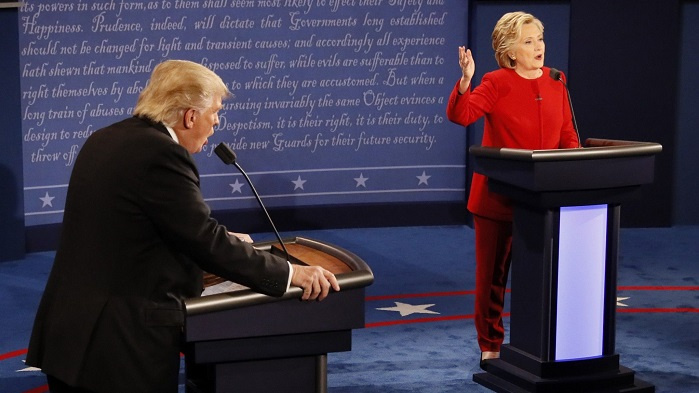Trump, Clinton and the Nuclear Deal

On Iranian twitterspace, one US-based artist said while half of his American friends were spending their evening in a bar and the other half were in a meeting, Iranians were solemnly analyzing and tweeting the Clinton-Trump debate. To this, many replied that the outcome of US elections may be much more consequential for Iranians, and for the Middle East, than American citizens.
A sound argument it appears to be, realizing how Iran's name was mentioned 19 times during the Monday night debate, while Russia, a strategic challenge to the United States, and China, the next superpower-to-be, followed by 13 and 12 references respectively. Indeed, Hillary Clinton's question whether Trump would "bomb Iran" if he came to power might also give a glimpse of the magnitude of American citizens' choice in November 2016 for Tehran.
On Washington Post's annotated text of the debate, the candidates' spar over Iran was only mentioned once by the commentators, but in Tehran, many may have a lot to put forth about what was said about their country on the night.
In Tehran, Reformist media tilted towards Hillary: "1-1 for Hillary" (Shargh), "The Night Hillary Defeated Trump" (Arman-e Emrooz); and did not forget to use the occasion to make a jibe at their rivals at home: Vaghaye Ettefaghieh published photos of Trump and Ahmadinejad side-by-side, claiming while the former "is coming to an end" after the first debate, the latter, advised by the Supreme Leader Ayatollah Khamenei not to run in 2017 presidential election, "doesn't want to come to an end". E'temad, a leading Reformist daily, called Hillary the victor of Monday night debate with the headline: "The Lawyer Won the Debate", evoking the historical moment in 2013 presidential debates of Iran where Hassan Rouhani called himself "a lawyer, not a colonel" addressing his major rival Mohammad-Bagher Ghalibaf and his presumed military-style politics.
Despite a tendency to view Democrats in a more positive light in Iranian Reformist media, to many who still remember Hillary Clinton's notorious remarks on how she would "totally obliterate" Iran if president in case Iran attacked Israel, there would be little difference between the two candidates in their Iran policy. Principlist media in Iran were hardly sympathetic towards any of the candidates in their Wednesday coverage of the news (the debate was held early Tuesday morning, Tehran time, thus no news on Tuesday.) Kayhan, the ultimate hardliner daily, chose a straightforward headline: "Iranophobia Race between Clinton and Trump in First TV Debate". The two candidates used Iran-bashing as a platform to reach the presidential post, the newspaper wrote, "to prove they have no difference in their hostility towards Iran." Javan, affiliated with IRGC, followed a similar line, choosing a similar headline, adorned with a indicative picture of Trump and Clinton amicably shaking hands. "We Shut Down Iran's Nuclear [Program]" was quoted Hillary by the hardliner Vatan-e Emrooz, critical of the nuclear deal like the majority of the Principlist ilk.
Iran's nuclear program and the historical deal, the Joint Comprehensive Plan of Action, JCPOA, held a dear place in the Monday night debate, with Hillary Clinton coming as defender of the diplomatic initiative, while Trump slamming the deal on several grounds.
In Iran, many, including the President Hassan Rouhani and top negotiators FM Javad Zarif and head of the national Atomic Energy Organization Ali-Akbar Salehi, have assured that whoever the next American president, the JCPOA will see no harm since it is an internationally-recognized contract backed by the United Nations. This is despite the fact that opponents of the deal in the US, including the Congress, are doing their best to minimize the benefits of the agreement for Iran through various measures, from US-entry restrictions for nationals from the visa waiver program countries who visit Iran, to banning cash exchange between the governments in Washington and Tehran.
At the third episode of the debate between the Republican and Democrat candidates, Trump, who had once bashed the deal for not obliging Iran to do business with American companies, only to take a turn and blast the Iran-Boeing 25 billion USD provisional agreement later, claimed that Iran "was ready to fall", and "choking" on the tough sanctions that kicked off mainly since 2011, but is know on the path towards becoming a major power "pretty soon" with sanctions relieved. Clinton, in response, backed the nuclear deal, which she views as her own brainchild, on grounds of a non-fact-checked basis, that Iran was "weeks away from having enough nuclear material to form a bomb" before the deal; a claim that even Netanyahu, a rabid opponent to the deal and a "[non-]happy camper" as Trump called him, would find hard to defend.
In his criticism of the JCPOA, Trump also showed how he was against compartmentalization of the nuclear talks: the belief that there was no need for a holistic approach and untangling the complex web of contentions between Iran and the West, from Middle East conflicts to human rights, before sitting at the table of negotiations. Trump showed his non-belief in the principle many viewed was key to success of the nuclear deal when he asked why Iran was not pushed during the talks and forced to pressurize North Korea, "one of [its] biggest trading partners" [sic] for a compromise. The infographic here shows how far Trump's claim from reality is, as Iran seems not able to make it into the list of top trading partners of the Communist republic. The nuclear deal, however, seems to have a bizarre power in making American politicians make counterfactual claims.

